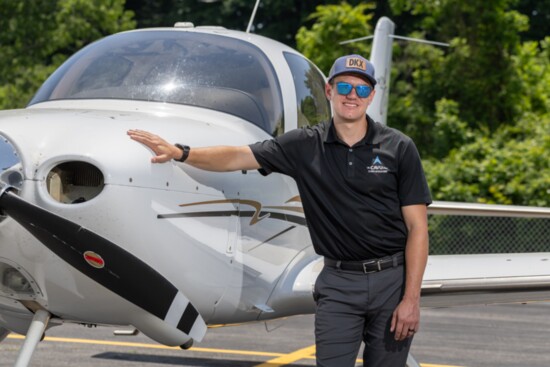Founder and CEO of The CAVU Pilot Eric Dragonetti admits his passion for aviation came later than perhaps other pilots. But he’s making up for lost time.
A New Jersey native, Eric landed in Knoxville in 2019 after getting a bachelor’s in Commercial Aviation at the University of North Dakota, moving to Phoenix “to thaw out” and gain flight instruction experience, and then flying for a regional airline out of Philadelphia. The draw was warmer weather and Knoxville was a crew domicile for his airline.
Then, Eric and his wife, Lindsey, fell in love with East Tennessee and bought their first home here. They met in college, and after Eric took Lindsey flying on a date to impress her, she too wanted to fly (common ground – Eric decided to fly after his first time in a Cessna 172). However, Lindsey became a helicopter pilot who flew commercially until she went back to college for a career in finance.
After four years of flying for the airline, Eric realized he missed flight instruction.
“I loved flying commercial jets, but I have a passion for teaching people how to fly,” Eric says. He taught with a local flight school in Knoxville until COVID shut operations down. “I took out a personal loan, bought a Cessna 150, and started teaching on my own.”
Eric, who has logged over 2,000 hours of flight instruction, didn’t teach solo for long. Since October 2020, The CAVU Pilot at Downtown Island Airport has grown to seven airplanes, ten flight instructors plus a full maintenance crew, and more than 100 active students.
Eric, with Lindsey who heads up financial operations, started the flight training academy to teach both those who want a career in aviation and those who want to fly for pleasure/business, and potentially buy or rent an airplane.
“That’s when I realized there was a shortage of high-end aircraft for rent in our area,” Eric explains. “We purchased a top-of-the-line Cirrus SR22 and started our Elite Flying Club, which is now the premier flying club in the area. We offer the luxury, convenience, comfort and safety our club members want. We originally capped it at 10 members to ensure availability and are assessing opening up to more members.
“Private aviation is piquing the interest of more and more people, especially with so many moving to Knoxville," he continues. "Whether it’s career or private interest, we have our hands full with a waitlist. We add airplanes and fill them right up.”
When Eric tells people what he does, their responses bring up barriers: I didn’t know I could learn to fly in Knoxville. I thought only the rich could afford to fly. I would love to fly, but I can’t figure out how to get started.
“I get it. The barriers seem daunting. FAA regulations and the sheer amount of information can be overwhelming. But with our flight training courses and ground school, our team of instructors knows how to successfully prepare students at each step of training, certifying and licensing.”
The CAVU Pilot caters primarily to those who become commercial pilots (80% of students) while 20% are private pilots who then want to rent or buy their own aircraft for personal and/or business travel.
FAQ
What are the age restrictions?
Commercial: Minimum age is 23.
Private: Minimum age for a license is 17. Flying solo is 16.
Affordability?
Commercial: $80,000 investment
Private: $15,000 investment
What is my time investment?
Commercial: Flight school three times per week, study, do your homework, get your hours in. To earn your license and all ratings offered takes two and a half years.
Private: Flight school three times a week, study a few hours each week and earn your license in four to six months.
How can I pay for flight training?
You can pay out of pocket via cash, check or credit card. The CAVU Pilot also offers financing programs for students to fund training with payments.
Return on Investment?
Commercial: You don’t need a college degree. You can earn your license at flight school for under $100,000. The starting salary for airline pilots is $100,000.* In comparison, invest $100,000 to earn your degree. Stats to recoup your investment over years varies by careers.
Private: Time. Students often have their own business and need to fly to job sites or are in commercial real estate in several states. Flying is more efficient. For example, Charleston is a six- or seven-hour drive. Flying gets you there in one and a half hours. Look at the ROI. What can you do with those five hours you saved? How does that change your business day? Leave in the morning and get back home for dinner. How does five saved hours change your weekend getaway or vacation plans?
“Our private pilots discover the life-changing return on investment of flying. That’s why we call an airplane a Time Machine. Lindsey and I leave at 5 p.m. on a Friday, make dinner reservations at 7 p.m. in Charleston, hang out for the weekend, and fly home Sunday at 5 p.m. Our team loves helping students discover the freedom in a classroom 3,000 feet in the sky.”
To learn more, call (865) 293-2001 or visit TheCavuPilot.com
*May 2022 Occupational Outlook Handbook, the Bureau of Labor Statistics, the salary of commercial pilots is $103,910/annually. The medial annual wage for airline pilots, co-pilots and flight engineers is $211,790.
“Our team loves to help students discover the freedom of a classroom 3,000 feet in the sky.”
